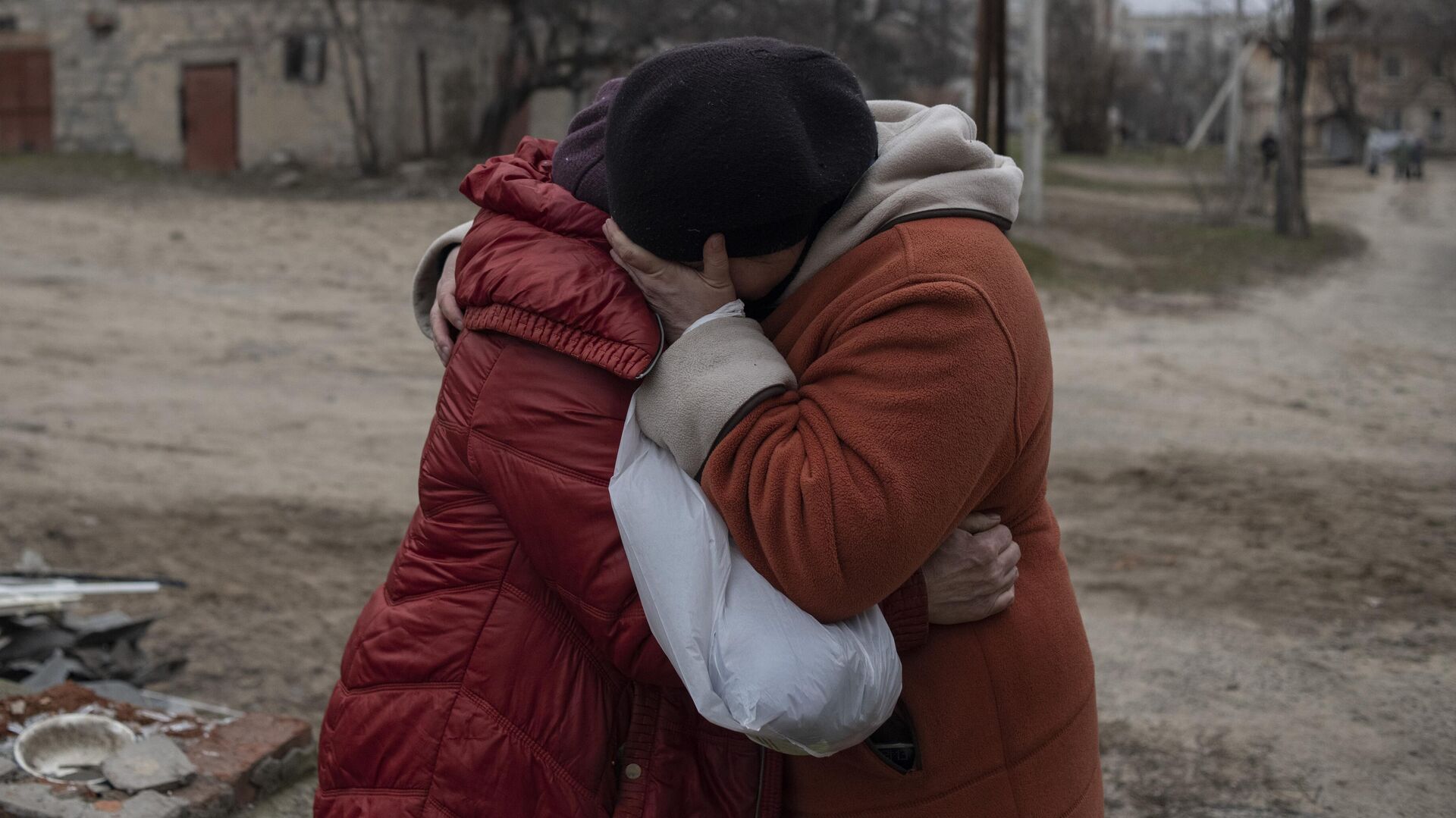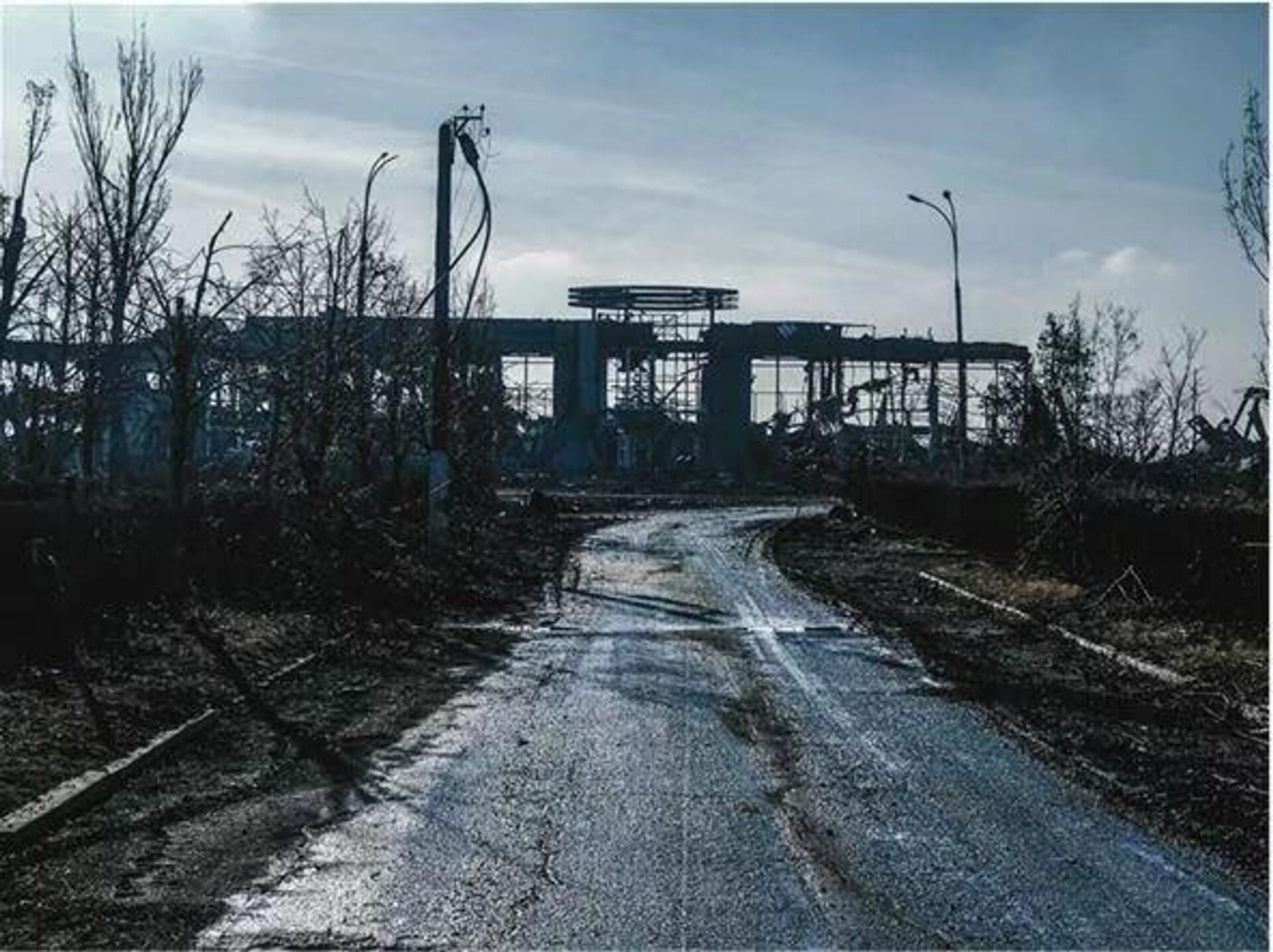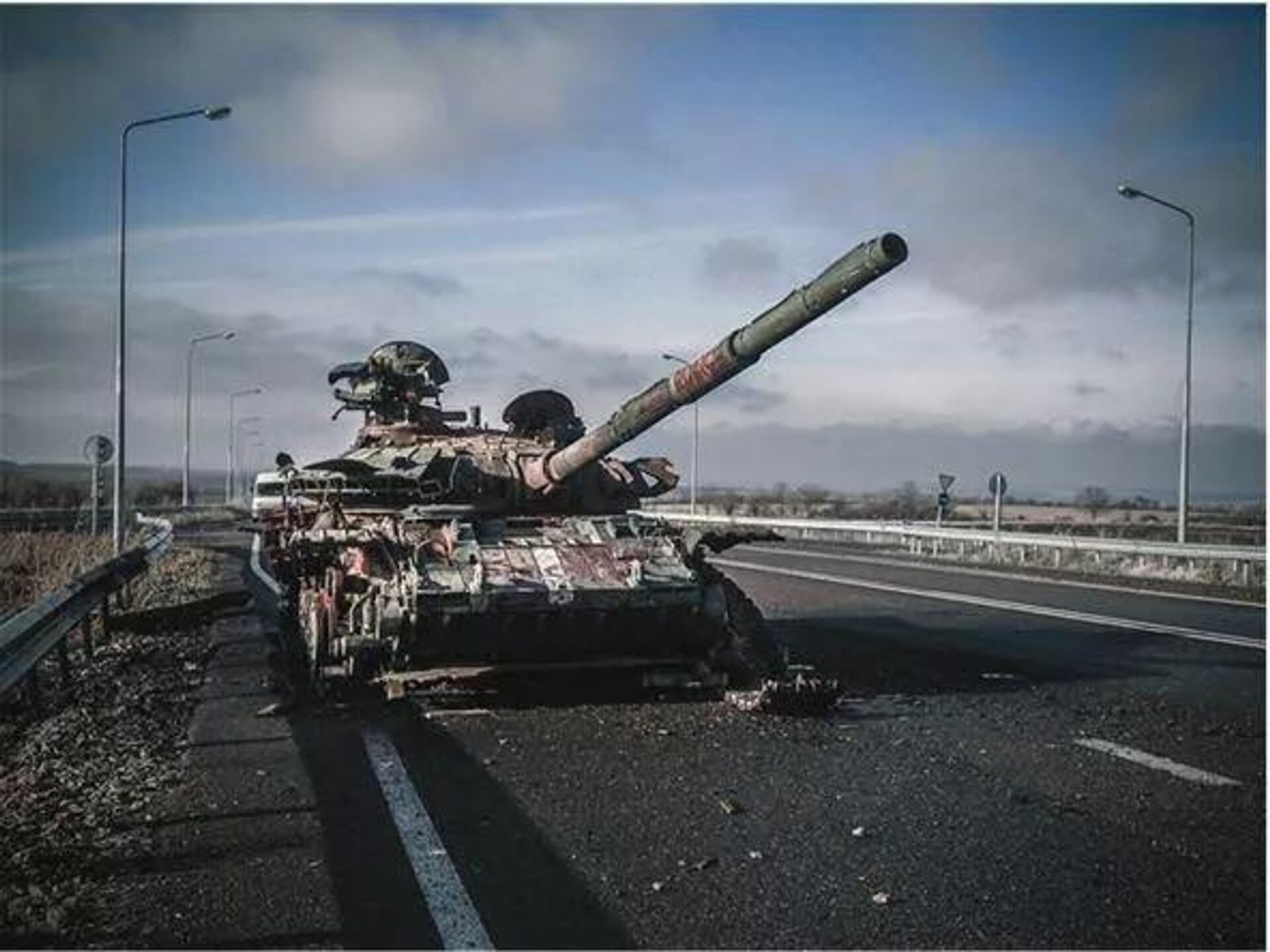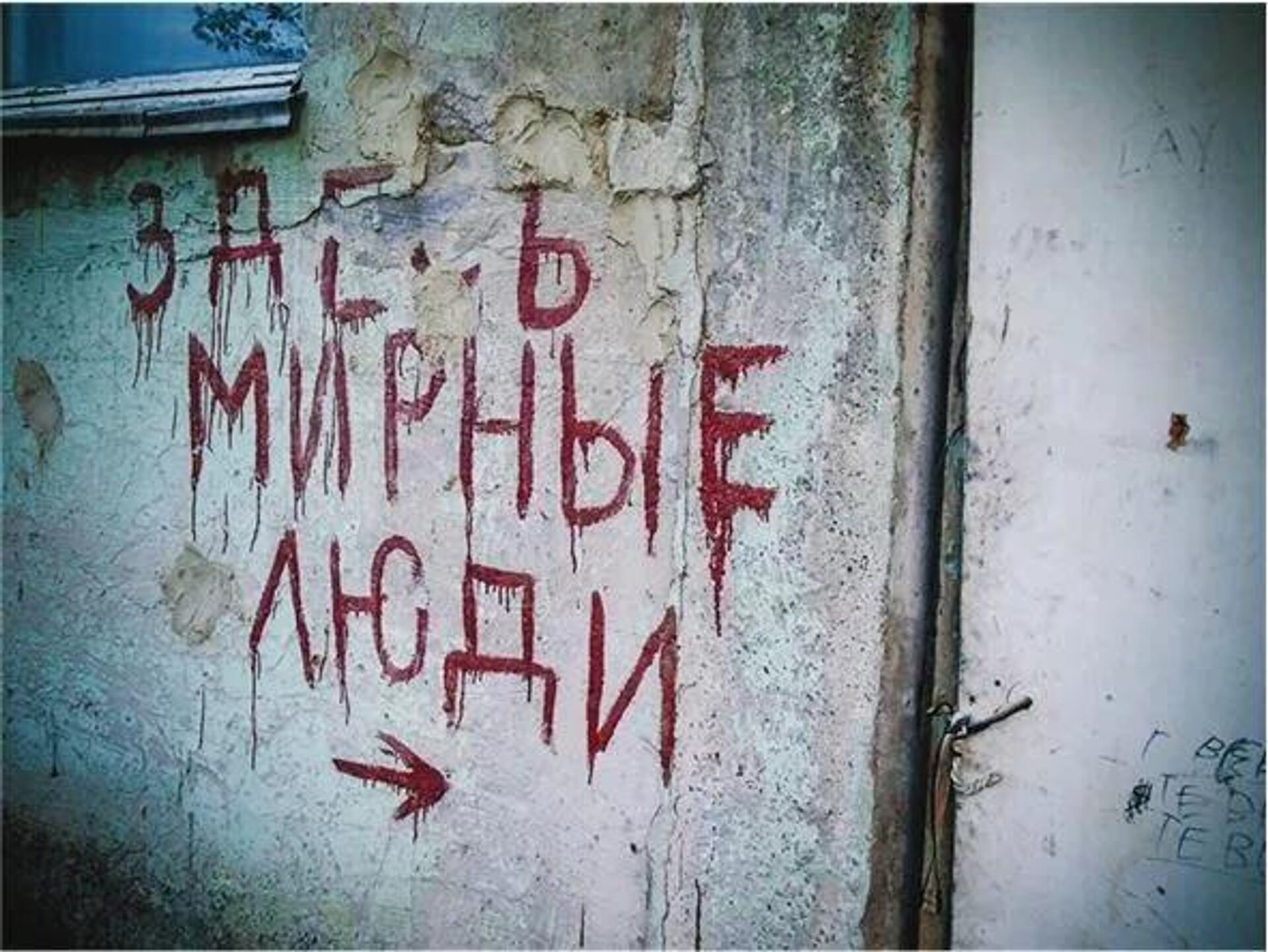https://sputnikglobe.com/20220411/tears-of-lugansk-part-four-the-diary-of-volunteer-evdokiya-sheremeteva-1094640122.html
‘Tears of Lugansk’. Part Four. The Diary of Volunteer Evdokiya Sheremeteva.
‘Tears of Lugansk’. Part Four. The Diary of Volunteer Evdokiya Sheremeteva.
Sputnik International
We continue to publish pieces from a heart-rending and sometimes unbearably honest book. This is a diary by journalist and volunteer Evdokiya Sheremeteva, who... 11.04.2022, Sputnik International
2022-04-11T05:01+0000
2022-04-11T05:01+0000
2022-08-06T12:10+0000
ukraine
donbass
donbass. genocide. 2014-2022
diary of volunteer evdokiya sheremeteva
https://cdn1.img.sputnikglobe.com/img/07e6/04/0a/1094643433_67:0:3708:2048_1920x0_80_0_0_839784752e78bef29c6b30acf90698d6.jpg
The sun is shining, there’s no snow. People walk with bags past burnt-out tanks, bombed-out shops. Life goes on, a simple and ordinary one. They are walking, laughing, chatting, and chewing sunflower seeds.I ask everyone: why, why won't they leave? They all give the same answer:– Where to? Who needs us? This is where we belong...– I'll take my mother on my back, she's sick, and down to the cellar. We can't leave her here, and where will we go? They shell out, come back in the evening. It's tough. But it'ы nothing... we're alive.We keep driving.– Do you want to see our airport?– I do.As we approach the airport, a column of cyclists with children passes by. We went for a ride on such a sunny day.A graveyard lies at the site of the airport. Burnt-out APCs, shell splinters and tons of iron.– Here, look what became of it. You see that?– Shells?I point at dozens of iron pieces, of which I understand nothing. Lena, a beautiful brunette in heels, skilfully:– This is from Grad rocket launcher.At first, I was confused by everything around me. That there were still people there. That they walk, talk, live. Now, when people ask me questions like that, I am surprised. It is as if I live there myself. The war has become my reality. The same reality as for Lida, who picks horseradish, and for Alyona (Lida's friend), who delivers babies in basements.How many times have I heard, after a long shelling, women ignore and spit on everything: “I'm sick of basements! I'm standing there, I hear it whistling - I drop to the floor, and then I get up - the food is burning!” – "Who's going to canner food? Poroshenko?"And then I myself, lying on Zhenya’s sofa, would ask quietly, "Zhenya, is it far?" – "Quite far away”, and continue chatting. And the Grads keep firing and firing in the background, chipping away at their march. And I don't notice...Mum, it's quiet and calm here! What's the matter with you?‘Lugansk and War’24 DecemberDiaryAs if after the apocalypse, people walk with groceries, past shattered houses, wrecked shops, and crumbling kindergartens. And women walk with children in prams.It's just about the people themselves. And the feeling. There is something unspeakable in the air that makes you realise: this is war.War is not combat activities and roads mangled from shells.War is about people. People, ordinary people living in hell.These are not abstract figures in the news: “so many killed, so many taken prisoner, so many wounded”. We hear these phrases so often that they stick elsewhere. We hide behind empty formalities so that we would not know the truth. So that it doesn't sting and cut us.War is the story of every human being. Of every person, of every particular individual. And these stories are impossible to listen to. One’s heart breaks into a thousand pieces.Can it be fixed?The city can be repaired, rebuilt as far as possible.Zhenya keeps pointing at different buildings in the centre. Some have been rebuilt, others still stand with holes in them.– You see that? That shop got hit by an air strike. I saw it myself. I climbed up on the roof because that was the only place where I could get a signal. And I could see which direction they came from and where they were firing from the air. And then I read on the Internet that it was the air-conditioners that blew up. Dunya, do you understand? I saw it myself! And they prove it to me: nothing is obvious, it's not clear, you were emotional, you're not an expert.Zhenya no longer has a job, his adult daughter has been living with her family and child in Kiev. And he does what it takes to deliver humanitarian aid. On his own, using his own money, to the places where the fighting is going on. He was the one who visited Pervomaisk and saw the catastrophe of the city, which has been under siege for six months. He always travels with his wife.– Zhenya, why together? It's dangerous...– If we die, we die together.Part One: ‘My War’Part Two: ‘Hunger in Lugansk’Part Three: ‘I Am in Lugansk’
ukraine
donbass
Sputnik International
feedback@sputniknews.com
+74956456601
MIA „Rossiya Segodnya“
2022
Sputnik International
feedback@sputniknews.com
+74956456601
MIA „Rossiya Segodnya“
News
en_EN
Sputnik International
feedback@sputniknews.com
+74956456601
MIA „Rossiya Segodnya“
Sputnik International
feedback@sputniknews.com
+74956456601
MIA „Rossiya Segodnya“
ukraine, donbass, diary of volunteer evdokiya sheremeteva
ukraine, donbass, diary of volunteer evdokiya sheremeteva
‘Tears of Lugansk’. Part Four. The Diary of Volunteer Evdokiya Sheremeteva.
05:01 GMT 11.04.2022 (Updated: 12:10 GMT 06.08.2022) We continue to publish pieces from a heart-rending and sometimes unbearably honest book. This is a diary by journalist and volunteer Evdokiya Sheremeteva, who throughout the eight years of the war brought humanitarian aid to Donbass, rescued the sick and the wounded, and collected her ruthless evidence of the truth.
The sun is shining, there’s no snow. People walk with bags past burnt-out tanks, bombed-out shops. Life goes on, a simple and ordinary one. They are walking, laughing, chatting, and chewing sunflower seeds.
I ask everyone: why, why won't they leave? They all give the same answer:
– Where to? Who needs us? This is where we belong...
– I'll take my mother on my back, she's sick, and down to the cellar. We can't leave her here, and where will we go? They shell out, come back in the evening. It's tough. But it'ы nothing... we're alive.
– Do you want to see our airport?
As we approach the airport, a column of cyclists with children passes by. We went for a ride on such a sunny day.
A graveyard lies at the site of the airport. Burnt-out APCs, shell splinters and tons of iron.
– Here, look what became of it. You see that?
I point at dozens of iron pieces, of which I understand nothing. Lena, a beautiful brunette in heels, skilfully:
– This is from Grad rocket launcher.
At first, I was confused by everything around me. That there were still people there. That they walk, talk, live. Now, when people ask me questions like that, I am surprised. It is as if I live there myself. The war has become my reality. The same reality as for Lida, who picks horseradish, and for Alyona (Lida's friend), who delivers babies in basements.
How many times have I heard, after a long shelling, women ignore and spit on everything: “I'm sick of basements! I'm standing there, I hear it whistling - I drop to the floor, and then I get up - the food is burning!” – "Who's going to canner food? Poroshenko?"
And then I myself, lying on Zhenya’s sofa, would ask quietly, "Zhenya, is it far?" – "Quite far away”, and continue chatting. And the Grads keep firing and firing in the background, chipping away at their march. And I don't notice...
Mum, it's quiet and calm here! What's the matter with you?
‘Lugansk and War’
24 December
Diary
As if after the apocalypse, people walk with groceries, past shattered houses, wrecked shops, and crumbling kindergartens. And women walk with children in prams.
It's just about the people themselves. And the feeling. There is something unspeakable in the air that makes you realise: this is war.
War is not combat activities and roads mangled from shells.
War is about people. People, ordinary people living in hell.
These are not abstract figures in the news: “so many killed, so many taken prisoner, so many wounded”. We hear these phrases so often that they stick elsewhere. We hide behind empty formalities so that we would not know the truth. So that it doesn't sting and cut us.
War is the story of every human being. Of every person, of every particular individual. And these stories are impossible to listen to. One’s heart breaks into a thousand pieces.
The city can be repaired, rebuilt as far as possible.
Zhenya keeps pointing at different buildings in the centre. Some have been rebuilt, others still stand with holes in them.
– You see that? That shop got hit by an air strike. I saw it myself. I climbed up on the roof because that was the only place where I could get a signal. And I could see which direction they came from and where they were firing from the air. And then I read on the Internet that it was the air-conditioners that blew up. Dunya, do you understand? I saw it myself! And they prove it to me: nothing is obvious, it's not clear, you were emotional, you're not an expert.
Zhenya no longer has a job, his adult daughter has been living with her family and child in Kiev. And he does what it takes to deliver humanitarian aid. On his own, using his own money, to the places where the fighting is going on. He was the one who visited Pervomaisk and saw the catastrophe of the city, which has been under siege for six months. He always travels with his wife.
– Zhenya, why together? It's dangerous...
– If we die, we die together.





